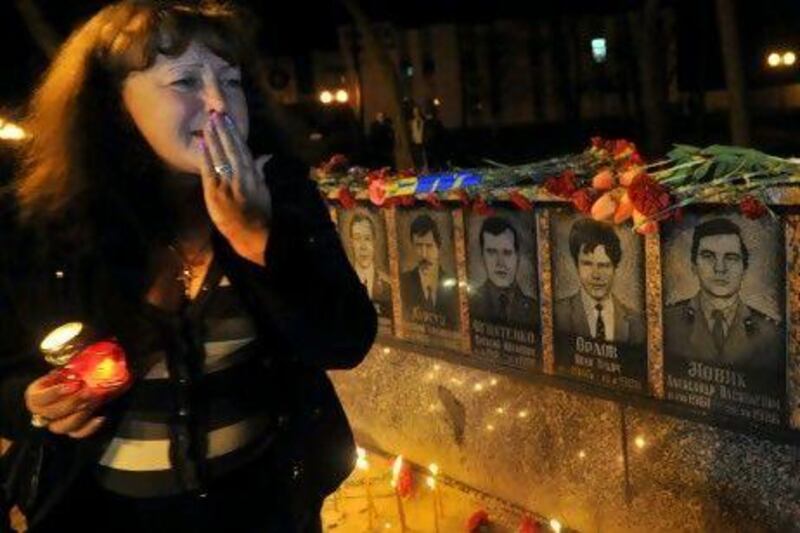SLAVUTICH, UKRAINE // The siren wailed at 23 minutes after midnight. It was the cue for Chernobyl's former liquidators - the people who cleaned and contained the radioactive reactor after it exploded 26 years ago - to head towards a black marble monument to their fallen colleagues.
The memorial anchors one end of the main square in Slavutich, a town hastily built by the former USSR to accommodate Chernobyl's workers and their families evacuated from the contaminated city of Pripyat.
A quarter century after the world's worst nuclear accident occurred at the nuclear facility 50 kilometres away, Slavutich is also trying to survive.
Its future is a barometer for the rest of the communities throughout Ukraine, Belarus and Russia that were also displaced by Chernobyl's radioactive plume.
The meltdown has cost Ukraine's economy US$180 billion (Dh661bn), according to Mykola Azarov, Ukraine's prime minister.
After the Chernobyl disaster, the Soviet government decided to create a town from scratch, building an array of apartment blocks and green playgrounds.
"We have this joke here," said Tatiana Boyko, the head of the town's department of family and youth affairs. "Slavutich is the last monument in the Soviet Union."
Today, Slavutich officials like to brag about the 1.6 per cent unemployment rate and an economic zone that hosts new businesses such as laser manufacturing. One Slavutichite has become a nationally known singer.
But the city is shrinking. Its population has declined from 56,000 at its peak to 24,000 today. A quarter of those are retired nuclear plant workers, estimates the city government.
Nearly half the city's budget comes from Chernobyl-related funds, says the mayor, Volodymyr Udovichenko.
Every day, hundreds of workers still travel by train to the plant, even though the three reactors that operated after the accident shut down in 2000. Construction has just begun on a new sarcophagus to contain the fourth unit's remains.
Once the sarcophagus is completed in 2015, even fewer workers will be needed.
"Slavutich is not addicted to the plant," insists Mr Udovichenko. "Slavutich is ready to answer the challenge of the future."
But in this city created from disaster, yesterday was about remembering.
A Chopin nocturne played as the liquidators, some of them in their 70s, inched past solemn youths holding red lanterns towards the memorial. Some of the teenagers wore fake radiation protection suits.
Valentin Ivanov, 75, clasped a candle and two carnations to place at the monument. His jacket was weighted down with medals from Ukraine and the former USSR given for his work at the plant.
An engineer and liquidator at the nuclear plant for 25 years, he had been deputy head of the Chernobyl Nuclear Power Plant workers' union. He says only 16 of the plant's 6,000 workers had refused to return to work at the plant.
Not long after being evacuated to Slavutich, he had been offered a flat in Kiev for him, his wife and their three children. But he had grown to love the nature and fishing around his new home in Slavutich.
"I refused," he said. "Slavutich is the natural place for me."






